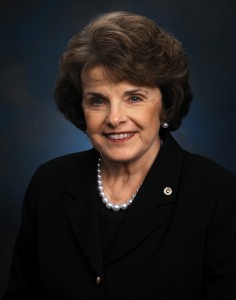By Senator Dianne Feinstein
Chalk up a win for moms around the country.
After years of battle, the chemical industry has reversed its longstanding position against restrictions on the controversial chemical bisphenol A, known as BPA, and asked the Food and Drug Administration to revise regulations on the use of the chemical in baby bottles and sippy cups.
It is ironic that the industry asking federal regulators to revise BPA standards is the very same industry that spent millions of dollars lobbying to block my legislation restricting the use of this dangerous chemical.
The American Chemistry Council must have realized that no matter how much money they spent, no parent, grandparent or concerned person would stand by while our children are used as guinea pigs with a chemical that could seriously harm their immediate and long-term health.
BPA is an endocrine disruptor, meaning that it can interfere with how hormones work in our bodies by changing their normal function. More than 200 studies link BPA exposure to breast and other cancers, reproductive disorders, cardiac disease, diabetes, early puberty and other problems.
Yet, the chemical industry stubbornly refused to listen to science and concerned consumers, and instead leaned on lawmakers.
Last year, the American Chemistry Council actually lobbied to prevent a vote in the Senate on the change it now seems to be advocating–a national ban on BPA in baby bottles and sippy cups.
Here’s why I think chemical industry lobbyists failed: Even though they successfully blocked a vote on BPA, consumers took matters into their own hands and voted against BPA with their wallets. Every time a BPA-free product was purchased, it marked a setback for the chemical industry.
For years the chemical lobby ignored the pleas of concerned parents, environmentalists and advocacy groups that called for a ban on BPA. Companies ignored the studies and continued to argue that there was no established link between BPA and many illnesses. There was simply no other alternative, the companies insisted—baby bottles and sippy cups could only be made with BPA.
Clearly they were wrong.
Read more at Senator Dianne Feinsten’s website
Continue reading... →

